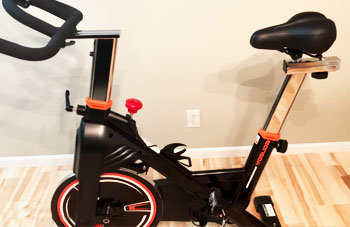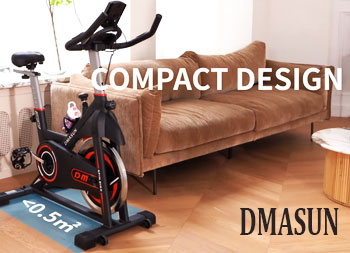Stationary bikes are a popular choice for cardio workouts at home. They provide a solid workout without stressing your joints. Two top brands for affordable stationary bikes are Yosuda and DMASUN.
But which one is the better option for your home gym? Here is an in-depth comparison of the Yosuda vs DMASUN exercise bikes.
A Brief Comparison Table
| Feature | Yosuda | DMASUN |
| Price | Under $200 | Under $200 |
| Resistance Levels | 16 | 16 |
| Weight Capacity | 330 lbs | 330 lbs |
| LCD Display | Basic | Basic |
| Tablet Holder | Yes | Yes |
| Adjustable Handlebars | No | Yes |
| Adjustable Seat | Yes | Yes |
| Transport Wheels | Yes | Yes |
| Belt Drive | Quiet belt | Quiet belt |
| Warranty | 1 year | 1 year |
| Maximum User Height | 6’2″ | 6’1″ |
Overview of the Yosuda Exercise Bike
The Yosuda exercise bike is a budget-friendly stationary bike with good basic features. Here are the pros and cons of this model:

Pros:
- Low price under $200
- Smooth and quiet belt drive system
- 16 levels of magnetic resistance
- 330 lb user weight capacity
- LCD display tracks time, speed, distance, calories
- Tablet holder for entertainment
- Adjustable seat height
- Transport wheels for mobility
- Space-saving design
Cons:
- No handlebar adjustments
- Basic LCD display lacks backlight
- Short 12-month warranty
- Max user height is 6’2″
Overall, the Yosuda bike offers excellent value for the price. It’s a good choice for beginners looking for an affordable, quiet exercise bike for cardio workouts at home. The smooth magnetic resistance provides a good workout for legs and glutes. Just note the limited warranty and lack of adjustments.
Overview of the DMASUN Exercise Bike
Like the Yosuda, the DMASUN exercise bike is affordably priced under $200. Here are its notable features:
Pros:
- Affordable price usually under $200
- Quiet belt drive system
- 16 levels of magnetic resistance
- 330 lb user weight capacity
- Basic LCD tracks time, speed, distance, calories
- Adjustable handlebars and seat height
- Tablet holder included
- Smooth pedaling motion
- Transport wheels for portability
- Space-saving footprint
Cons:
- Limited 12-month warranty
- Basic display lacks backlight
- Max user height of 6’1″
- Seat comfort could be better
The DMASUN bike comes with the same 16 resistance levels as the Yosuda. The key advantage is the adjustable handlebars, providing a more customized fit. It’s a good choice for shorter users under 6’1″.
Also Read: Comparison Between Cyclace and Yosuda
Key Differences Between Yosuda DMASUN
Now let’s take a detailed look at how the Yosuda and DMASUN exercise bikes compare in terms of key features and performance.

- Design and Build Quality
Both bikes have sturdy steel frames with a maximum user capacity of 330 lbs. The DMASUN bike measures 41 x 19 x 43 inches (L x W x H). The Yosuda comes in at 42 x 22 x 40 inches. So they have a similar compact footprint.
The DMASUN bike weighs 53 lbs while the Yosuda is 44 lbs. The slightly heavier DMASUN frame feels more stable during intense cycling workouts.
Both bikes have smooth, quiet belt drive systems instead of a noisy chain. This makes them good options for apartments or shared spaces.
One advantage of the DMASUN is the adjustable handlebars, allowing you to find a comfortable hand position. The Yosuda bike has fixed handlebars. So the DMASUN bike can better accommodate users of different heights.
Overall, both bikes are well-built for their low prices. The DMASUN frame is a bit more sturdy. But the lighter Yosuda bike may be easier to move.
- Resistance System
The Yosuda and DMASUN exercise bikes both come with 16 levels of manual magnetic resistance. To increase resistance, you turn the tension knob while pedaling. Magnetic resistance provides a smooth, quiet cycling motion without maintenance needs.
Users report the resistance feels reasonably challenging on both bikes. The tension ranges from easy pedaling up to a tough workout for experienced cyclists. Turning up the resistance works your leg muscles harder.
While 16 levels may not offer as wide a range as pricier bikes, it’s ample tension for low to moderate intensity training. Most buyers find the resistance systems comparable between the two brands.
- Comfort and Adjustability
A comfortable bike fit is crucial for enjoyable cycling workouts at home. Both the Yosuda and DMASUN bikes have basic adjustability features to accommodate different users.
The DMASUN bike offers more customization with its adjustable handlebars. You can raise or lower them to find an optimal hand position. This adds comfort for riders of different heights.
Both bikes allow you to adjust the seat height up or down. This helps you fine tune the leg extension for proper pedaling form. However, some users complain about seat comfort on the DMASUN bike.
The seat may feel too hard and small for larger riders. The Yosuda’s seat gets better reviews for comfort. But you can always replace the seats if needed.
For accessibility, the DMASUN bike’s adjustable parts make it the better choice. The fixed handlebars on the Yosuda limit hand positions for taller and shorter riders.
- Display Console
The LCD displays on the Yosuda and DMASUN exercise bikes are very basic. You shouldn’t expect many bells and whistles at this price point.
Both consoles track your workout time, speed, distance, calories burned, and odometer. The single button lets you scan between the metrics. This gives you feedback on your cycling progress.
However, the LCD screens are small and lack a backlight. So it may be hard to monitor your stats during intense workouts. You’ll get your heart rate by checking your pulse manually.
Overall, the displays get the job done for monitoring basic workout data. Neither bike provides advanced features like workout programs, heart rate tracking, or entertainment connectivity.
For motivation and entertainment, you can use the included device holder to watch videos or stream classes on your tablet.
Also Read: Comparison Between Yosuda and Echelon
- Noise Level
One perk of the Yosuda and DMASUN exercise bikes is their quiet operation. Both utilize a belt drive system that runs smoother and quieter than chain drive bikes. You can use them for early morning cardio without disturbing housemates.
Users say both bikes are very quiet and smooth during cycling. You may hear a faint whirring from the flywheel at higher speeds.
But noise is minimal, especially compared to cheap bikes with chain drives. The quiet performance makes them good options for apartments, shared spaces, and watching TV while riding.
- Warranty
The warranties are identical for the Yosuda and DMASUN stationary bikes. Both come with a 1-year limited warranty from the manufacturer. This covers defects in materials and workmanship for 1 year from original purchase.
The short warranty is typical for lower priced exercise bikes. It mainly protects against early flaws or breakages. Make sure to follow the weight limits and proper maintenance. Extended protection plans are available if you want more coverage.
Overall, the 1 year coverage provides basic protection. But don’t expect an overly generous or long warranty at this price point.
Also Watch This Review Video:
- Pricing and Value
Affordability is the biggest selling point of both the Yosuda and DMASUN exercise bikes. They usually cost between $150-$200 online. This makes them two of the most budget-friendly options among magnetic indoor bikes.
At just under $200, these bikes provide good value for basic cardio workouts and spinning at home. You get features like quiet magnetic resistance, LCD feedback, and tablet holders. This compares well vs. more expensive bikes for the price.
Both Yosuda and DMASUN offer beginner-friendly exercise bikes that won’t break the bank. But you make some trade-offs in terms of limited warranties, display features, and adjustments.
- Assembly and Maintenance
Assembling the Yosuda or DMASUN exercise bike is straightforward following the included instructions. Plan on about 30-60 minutes for assembly. The tools needed for installation are included.
These indoor bikes require minimal maintenance thanks to their belt drive design. You just need to wipe down the bikes after workouts and check for any loose parts occasionally. Keep them well away from moisture to prevent rust on the steel frames.
The belt drive doesn’t require lubrication like a chain. But occasionally check for loosening or wear after a few months of frequent cycling. Replacing exercise bike belts is an easy fix.
Overall, both options are easy to maintain. The simple magnetic resistance systems also eliminate routine tune-ups needed for air or hydraulic bikes.
Also Read: Choose Between Tmpl And Equinox.
Frequently Asked Questions (FAQs)
Yes, magnetic resistance bikes like the Yosuda and DMASUN provide an effective cardio and strength workout. The friction from the flywheel magnets forces your leg muscles to work harder with increasing resistance levels. This builds endurance and burns calories like cycling outdoors.
The best exercise bike depends on your budget and training needs. For under $200, the Yosuda and DMASUN offer quality magnetic bikes. Mid-range options with more features run $500-$1,500. Commercial-grade studio bikes cost over $2,000.
Cycling is great for weight loss and cardio conditioning. The adjustable resistance lets you tailor the intensity to your fitness level. Low to moderate effort cycling burns fat and calories. Combine with a healthy diet for optimal weight loss results.
Top brands for home exercise bikes include Schwinn, Sunny Health & Fitness, Yosuda, DMASUN, Echelon, Keiser, Peloton, and NordicTrack. Consider your budget and which features are most important like warranty, programs, and technology.
Also Read: Comparison Between Schwinn 430 and Sole E25
Final Thoughts
For affordable home exercise bikes, both Yosuda and DMASUN offer quality options. The Yosuda bike provides a smooth, quiet ride with good value under $200. Go with the DMASUN for more adjustability to customize the fit.
Focus on the features most important for your workouts like seat comfort, handlebar position, and resistance range. This will help choose the best budget-friendly exercise bike as you get started cycling at home.
